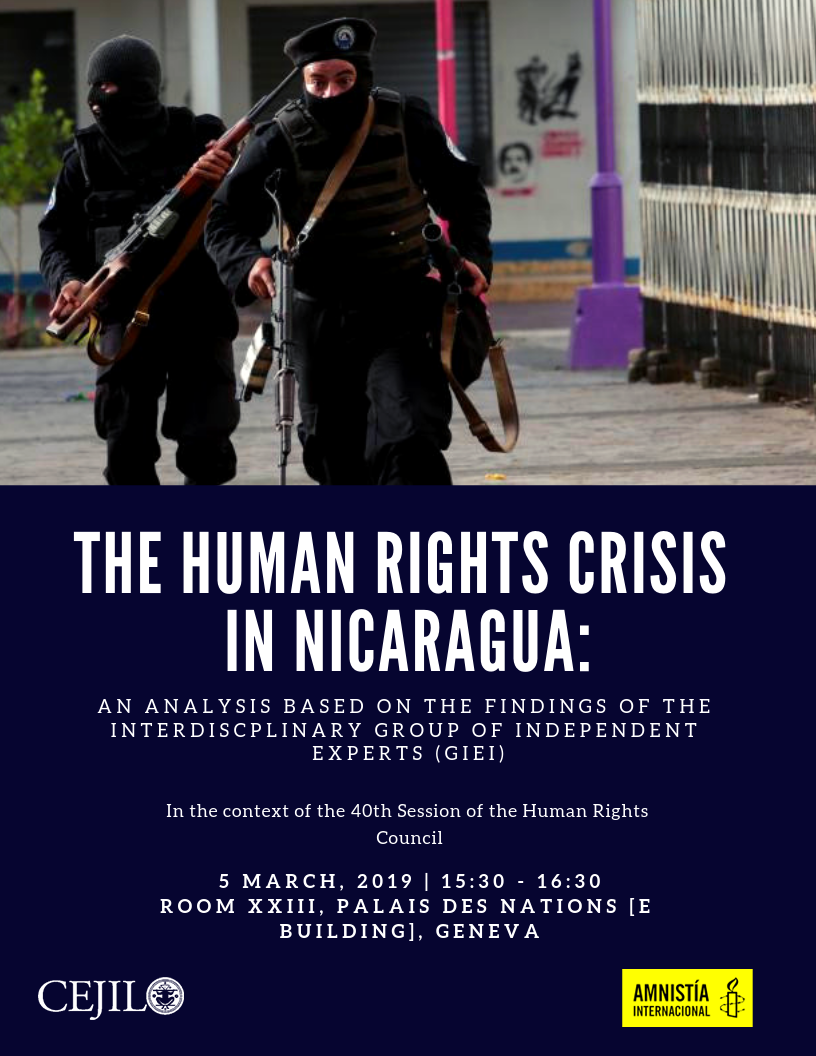






San José/ México City, march 28th.- Amnesty International and the Center for Justice and International Law (CEJIL) will host a side event to present the main findings of the recent Interdisciplinary Group of Independent Experts (GIEI) report on the grave human rights situation in Nicaragua at the 40th session of the United Nations Human Rights Council in Geneva on Tuesday 5 March.
The event will provide the Human Rights Council delegates the opportunity to hear first-hand the results of the GIEI, whose installation was promoted by the Inter-American Commission on Human Rights.
Amnesty International and CEJIL are calling on the Human Rights Council to adopt a resolution on Nicaragua during its 40th session that would set out clear remedial actions to be taken by the government and put in place a monitoring and reporting mechanism.
Hilary Power, Amnesty International’s Senior Advocate for the UN Human Rights Council, will moderate the event. The panelists will be Pablo Parenti, a member of the GIEI; Claudia Paz y Paz Bailey, a former GIEI member and the Director for Mesoamerica at CEJIL; and Joel Hernández, Vice President and Rapporteur on the Rights of Persons Deprived of Liberty of the Inter-American Commission on Human Rights (IACHR).
The event, “The human rights crisis in Nicaragua: an analysis based on the findings of the Interdisciplinary Group of Independent Experts (GIEI)”, takes place on 5 March from 15:30 to 16:30 local time at Room XXIII, Palais des Nations [E Building] in Geneva, Switzerland.
Claudia Paz y Paz Bailey will be available for interviews.
On 18 April 2018, forces under the command of President Daniel Ortega began violently repressing protests against social security reform, initiating Nicaragua’s worst human rights crisis in decades. At least 325 people have died violently in the context of protests, hundreds have been arbitrarily detained, and thousands have been forced to flee to Costa Rica.
The situation continues to deteriorate, seriously impacting upon freedom of expression and association. In December, Nicaraguan authorities increased their repression towards civil society organizations and independent media by cancelling the legal status of nine organizations and shutting down four media outlets.
The GIEI arrived in Nicaragua last July to investigate violent acts and issue recommendations for the attention of victims, and presented its report on 20 December, concluding that “many crimes committed in the context of the repression of the protests constitute crimes against humanity”.
Interdisciplinary Group of Independent Experts (GIEI) Nicaragua (Executive Summary, 21 December 2018): Link
Instilling terror: From lethal force to persecution in Nicaragua (Report, 18 October 2018): Link
Nicaragua: Authorities stepped up strategy for repression, committing grave human rights violations during ‘clean-up operation’ (News, 18 October 2018): Link
Nicaragua: Government maintains strategy of repression and criminalizes the right to protest (News, 15 October 2018): Link
Help us continue this critical and urgent work with a donation!
DONATE NOW